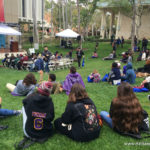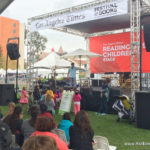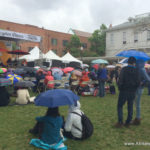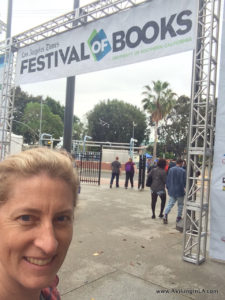 Last year, as luck would have it, I was able to go to the Los Angeles Times’ Festival of Books both days. On Saturday, I went alone and explored and lingered as I pleased. On Sunday, Sonny joined me for a more intentional day. It was the perfect combination of experiences.
Last year, as luck would have it, I was able to go to the Los Angeles Times’ Festival of Books both days. On Saturday, I went alone and explored and lingered as I pleased. On Sunday, Sonny joined me for a more intentional day. It was the perfect combination of experiences.
Saturday was a gray, dreary, rainy day, but I didn’t let that stop me. I donned my rain boots and rain jacket, packed an umbrella, and headed to our nearest Metro stop.
Taking the Metro made the excursion so easy. The closest stop was only a short drive away (and now it’s even closer with the Expo extension completed), and the stop at USC was right at the entrance to the festival. There were no hassles driving and finding my way and no expensive parking fees.
Due to the weather, the festival on Saturday wasn’t as lively as in previous years. There weren’t as many people roaming the grounds, and the booths were more closed up with plastic tarps on the sides. It did make maneuvering around more manageable, though. I easily browsed booths and listened in on stages where poets and authors spoke to more intimate audiences.
- Poetry Stage
- Children’s Stage
- YA Stage
A highlight of the day was that I was able to get a ticket to a panel, also known as Conversations. I had never been to a Conversation. I had always been somewhat overwhelmed by the selection of offerings. Also, I’ve always been at the festival with family members who haven’t been interested in that aspect of it. This year, I just went to the ticket booth and looked to see what was still available in the next couple of hours. It limited my choices immensely and I was able to easily find something.
I actually had a choice of many open Conversations from which to choose. I selected a young adult nonfiction panel about bringing history to life for young adult readers. Sonny had recently read the young reader adaptations of the nonfiction books Unbroken by Laura Hillenbrand and Boys in the Boat by Daniel James Brown, which he had really enjoyed. I’m always on the lookout for possible interesting reads for him, and this panel seemed like a potential opportunity for that.
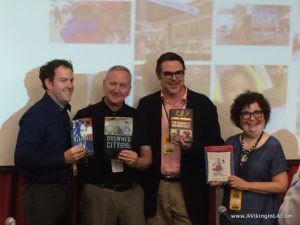 The panel was very interesting even though I wasn’t familiar with any of participants. Four authors of new non-fiction spoke about the process of bringing history to life for readers and then answered questions from the audience. I even bought a book by one of the panelists, Steve Sheinkin’s Most Dangerous: Daniel Ellsberg and the Secret History of the Vietnam War, and got it signed for Sonny for his birthday later in the month.
The panel was very interesting even though I wasn’t familiar with any of participants. Four authors of new non-fiction spoke about the process of bringing history to life for readers and then answered questions from the audience. I even bought a book by one of the panelists, Steve Sheinkin’s Most Dangerous: Daniel Ellsberg and the Secret History of the Vietnam War, and got it signed for Sonny for his birthday later in the month.
That evening I was on a high from my alone time at the festival. I was thrilled to have discovered how easy it was to go by Metro and how interesting panels could be. I looked to see if anything of interest was offered the next day. I found an available panel with middle grade authors, two of whom were favorites of Sonny’s, Stuart Gibbs (Spy School Series and FunJungle Series) and Pseudonymous Bosch (Secret Series and Bad Books Series). Sonny was interested but had his condition: he didn’t want to spend the whole day there. I reassured him it would only be a trip for the panel and food trucks and we’d be back home about 1 o’clock.
Sunday was a beautiful day, and I noticed a change already at the Metro stop. So many more people were headed to the festival. When we arrived at the festival, only about 30 minutes after opening, it was already very festive. Not only were more people there than the day before, but booths were more welcoming and music was playing.
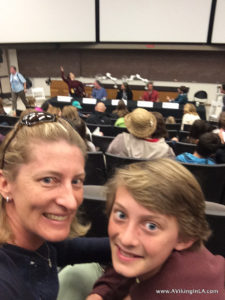 The panel was a popular one with many young readers in attendance. The panelists were engaging and shared insights into their writing lives. It was interesting to match a face, a voice, and a personality with the names we’d seen on book covers for so long. I wished, however, that Q&A time at the end had been limited to children. Their questions were so much better than adults’ questions.
The panel was a popular one with many young readers in attendance. The panelists were engaging and shared insights into their writing lives. It was interesting to match a face, a voice, and a personality with the names we’d seen on book covers for so long. I wished, however, that Q&A time at the end had been limited to children. Their questions were so much better than adults’ questions.
Afterwards we joined many other fans in line to have books signed. And just as promised, we checked out the food trucks and Sonny settled on some gelato.
Then came the unexpected addition to our festival visit. After Sonny and I had agreed on the plans for the morning, I had looked to see what geocaching possibilities were there. I had totally forgotten about that when I was there alone the day before. It turns out there were three geocaches within the festival grounds, and I secretly planned a route to include those spots.
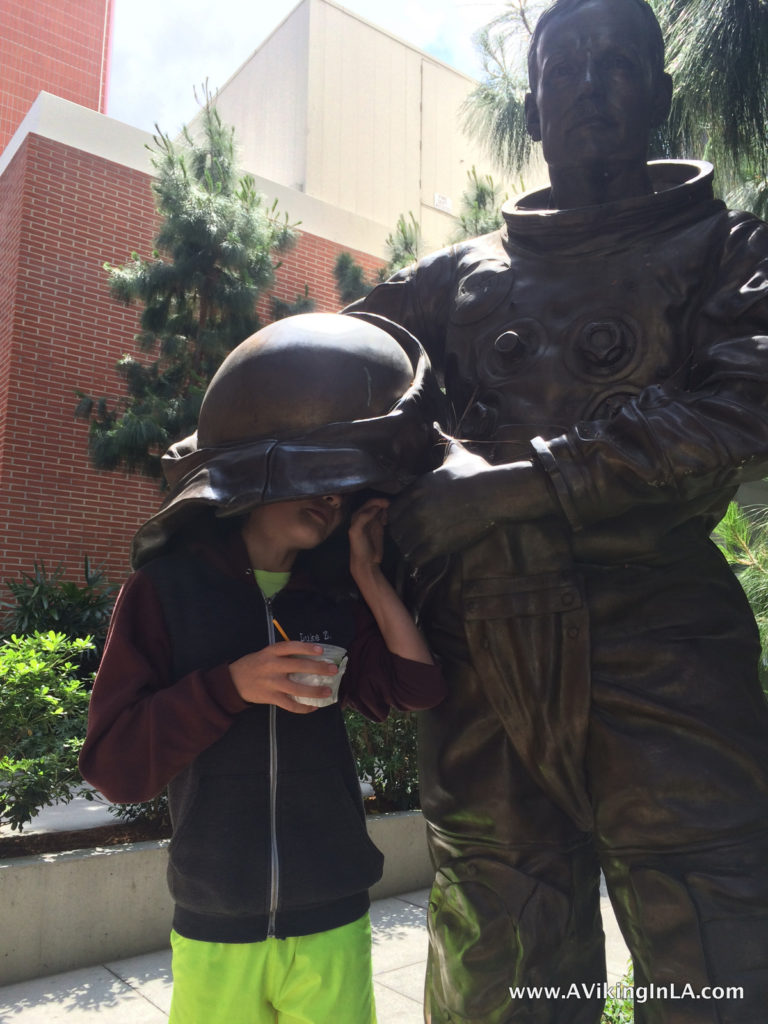 When Sonny heard about my geocaching hopes, he felt a little deceived. However, when it came down to it, he was eager to be the one to make the finds. He makes a good geocaching partner. We found one right in front of a security guard because no one thinks twice about a kid sticking his head up into a statue but an adult would have attracted attention.
When Sonny heard about my geocaching hopes, he felt a little deceived. However, when it came down to it, he was eager to be the one to make the finds. He makes a good geocaching partner. We found one right in front of a security guard because no one thinks twice about a kid sticking his head up into a statue but an adult would have attracted attention.
A day alone and a morning with Sonny was the perfect way to experience the festival. I felt like I had a chance to take it all in – browse the booths, listen to authors on stage, attend panels, enjoy music performances, watch artists at work, and indulge in some treats from food trucks.
This year’s festival will take place the weekend of April 22 and 23, and once again, it will be at University of Southern California’s campus. The schedule can be found online, and you can reserve free tickets to indoor Conversations ($1 service fee applies to each ticket). A limited number of tickets for each Conversation will also be available at the festival ticketing booth each day — free of service charges — while supplies last. There are also plenty of outdoor Conversations on stages that do not require tickets. And admission to the whole festival is free. I highly recommend you take advantage of this LA event.

